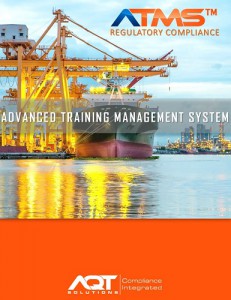
By Melissa Powers
AQT Solution’s Regulatory Compliance Analyst
Taking in a deep breath, you squint your eyes in deep focus trying to decipher the regulations concerning employer responsibility for hazmat training. You read…and read some more and then you honestly forget what you are reading and why. We’ve all been there. The reality is, it is critical to understand where your company’s responsibility lies on this topic. The lines sometimes become blurred and it is often a source of confusion in organizations especially in complex sub-contractor or vendor situations.
We need to look at 49 CFR §171.1 – Applicability of Hazardous Materials Regulations (HMR) to persons and functions. This part of the regulation explains who the HMR’s apply to. We see those that manufacture and test packaging are listed along with those that perform pre-transportation functions. These pre-transportation functions can essentially be thought of as anyone that offers, causes, or transports a hazardous material in commerce. That includes those that load and unload packages, check packages for discrepancies and mark and label packages. Transportation functions are also included in this description, meaning a carrier or driver who takes physical possession of a package for transport until it reaches its final destination. In a nutshell, this part of the regulation tells us that anyone who touches a hazmat package must comply with the HMR’s. Obviously, part of the HMR’s involves hazmat training which is where some companies question their responsibility.
Organizations that sub-contract couriers or drivers to move their hazmat often assume they aren’t responsible for ensuring proper hazmat training. Since the driver is not a direct employee, they feel slightly removed and in a way less responsible. The problem herein lies that when offering a hazardous material into commerce regardless of the individual being a direct employee or not these companies are accountable. Again, this goes back to 49 CFR §171.1. This can be as simple as asking for certificates of completion to verify successful training completion which also allows for a check of the description of training. There are a lot of hazmat training courses out there and verifying certificates will quickly help you determine if the training fits your needs. If not, then you may decide to train or move on to a courier that can meet your requirements.
In essence, if your organization offers a hazmat for transportation part of the responsibility rests with you to check for proper training. Hazmat training for transportation companies requires a modern systems to make complying with guidelines and regulations easier and more reliable. Regardless of direct employee or contract status make sure those you hire are properly trained. PHMSA offers a great guidance document on the topic and also discusses the liability that rests with certain entities. All companies in the hazardous materials transportation supply chain must help ensure the safe movement of these materials. Fines and penalties for hazmat violations, including not being able to produce the proper training records, are steep and can be pushed down affecting all parties involved. Make sure to do your due diligence and protect your organization and the public by ensuring those you hire are qualified.
